近三年安徽高考英语试题复习及2012年高考复习建议
高考英语的复习策略及建议
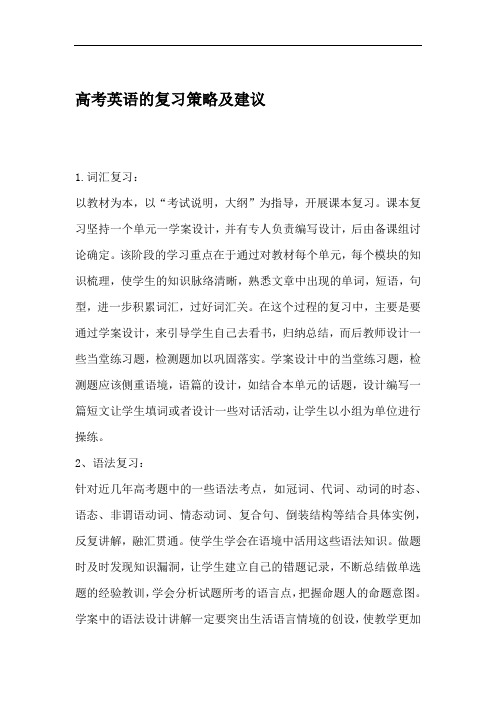
高考英语的复习策略及建议1.词汇复习:以教材为本,以“考试说明,大纲”为指导,开展课本复习。
课本复习坚持一个单元一学案设计,并有专人负责编写设计,后由备课组讨论确定。
该阶段的学习重点在于通过对教材每个单元,每个模块的知识梳理,使学生的知识脉络清晰,熟悉文章中出现的单词,短语,句型,进一步积累词汇,过好词汇关。
在这个过程的复习中,主要是要通过学案设计,来引导学生自己去看书,归纳总结,而后教师设计一些当堂练习题,检测题加以巩固落实。
学案设计中的当堂练习题,检测题应该侧重语境,语篇的设计,如结合本单元的话题,设计编写一篇短文让学生填词或者设计一些对话活动,让学生以小组为单位进行操练。
2、语法复习:针对近几年高考题中的一些语法考点,如冠词、代词、动词的时态、语态、非谓语动词、情态动词、复合句、倒装结构等结合具体实例,反复讲解,融汇贯通。
使学生学会在语境中活用这些语法知识。
做题时及时发现知识漏洞,让学生建立自己的错题记录,不断总结做单选题的经验教训,学会分析试题所考的语言点,把握命题人的命题意图。
学案中的语法设计讲解一定要突出生活语言情境的创设,使教学更加的真实化和生动化。
如在讲一般现在时,一般过去时,过去进行时,现在进行时这几种时态时,可以编制如下一段话:Nowtheteacheristellingyouastory.MarystudiesatNO.6middles chool.Sheisalwaysreadytohelpothers.Oneday,whileMarywaswalki ngdownastreet,shesawanoldwomancrossingthestreet.Shewentupto thewomenandhelpedher.Shesetsagoodexampleforus.Allofusshould 首先,让学生们在小组内分别把这个故事learnfromherfromnowon. 所发生时间写下来。
超实用高考英语复习:2012年全国1卷完形填空- 完形填空重难点词组整理
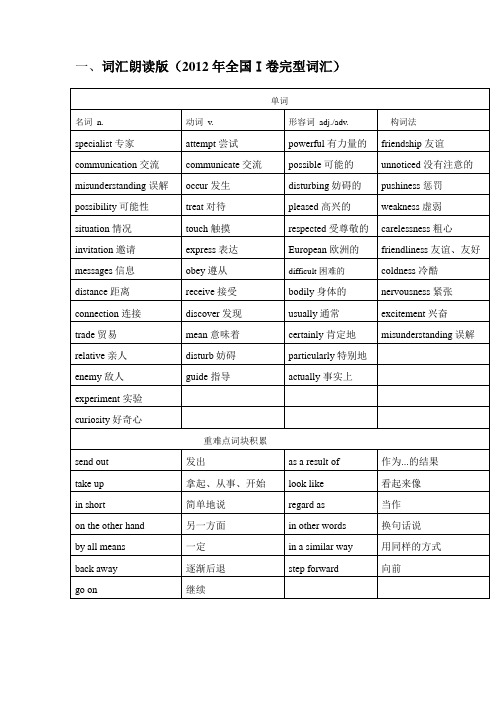
一、词汇朗读版(2012年全国I卷完型词汇)二、2012年全国I卷完型第一节完形填空(共20 小题;每小题两分,满分40分)阅读下面短文,从短文后各题所给的四个选项(A,B,C,D)中,选出可以填入空白处的最佳选项,并在答题卡上将该项涂黑。
Body language is the quiet, secret and most powerful language of all! It speaks 36 than words. According to specialists, our bodies send out more 37 than we realize. In fact, non-verbal (非言语) communication takes up about 50% of what we really 38 . And body language is particularly 39 when we attempt to communicate across cultures.Indeed, what is called body language is so 40 a part of us that it’s actually often unnoticed. And misunderstandings occur as a result of it. 41 , different societies treat the 42 between people differently. Northern Europeans usually do not like having 43 contact (接触) even with friends, and certainly not with 44 . People from Latin American countries, 45 , touch each other quite a lot. Therefore, it’s possible that in 46 , it may look like a Latino is 47 a Norwegian all over the room. The Latino, trying to express friendship, will keep moving 48 . The Norwegian, very probably seeing this as pushiness, will keep 49 — which the Latino will in return regard as 50 .Clearly, a great deal is going on when people 51 . And only a part of it is in the words themselves. And when parties are from 52 cultures, there’s a strong possibility of 53 . But whatever the situation, the best 54 is to obey the Golden Rule: treat others as you would like to be 55 .36. A. straighter B. louder C. harder D. further37. A. sounds B. invitations C. feelings D. messages38. A. hope B. receive C. discover D. mean39. A. immediate B. misleading C. important D. difficult40. A. well B. far C. much D. long41. A. For example B. Thus C. However D. In short42. A. trade B. distance C. connection D. greetings43. A. eye B. verbal C. bodily D. telephone44. A. strangers B. relatives C. neighbours D. enemies45. A. in other word B. on the other hand C. in a similar way D. by all means46. A. trouble B. conversation C. silence D. experiment47. A. disturbing B. helping C. guiding D. following48. A. closer B. faster C. in D. away49. A. stepping forward B. going on C. backing away D. coming out50. A. weakness B. carelessness C. friendliness D. coldness51. A. talk B. travel C. laugh D. think52. A. different B. European C. Latino D. rich53. A. curiosity B. excitement C. misunderstanding D. nervousness54. A. chance B. time C. result D. advice二、词汇检测版(2012年全国I卷完型词汇,满分100分)高考质量提升是一项系统工程,涉及到多个方面、各个维度,关键是要抓住重点、以点带面、全面突破,收到事半功倍的效果。
高考英语备考复习计划书

高考英语备考复习计划书高考英语备考复习计划书高考英语备考复习计划书1根据20xx年高考英语试题特点,结合我校学生实际情况,我们对高三的备考复习进行整体计划,确定各阶段的主要教学任务,旨在加强教学研究,提高每一阶段教学的效率,提高学生学习的主动性和有效性。
各位老师要知晓整体计划及进度,并结合自己学生学情进行适当增减。
具体计划如下:1、第一轮复习基础知识强化总复习:研读《考纲》,明确考试范围及要求,统一进度。
关注高考新动向,及时调整教学。
强调基础知识系统性,帮助学生构建知识网络,地毯式扫描复习,发现问题。
注意优生的提高,关注后进生及边缘生。
把语法知识的复习与基础知识复习同步进行,精讲精练。
听力块:根据二级听力试题特点,加强听力训练。
每日必听,熟悉语速,连读形式,了解出题方式等,训练听力技巧。
词汇块:狠抓词汇过关,这一阶段进行两次高一、高二单词复习记忆,人人过关;并学习高三单词。
语言点块:高一、高二所出现重点语言点需要不断加强巩固记忆、灵活应用,注重情景应用。
语法块:动词等各种词法、句型:简单句(6种)、复合句、并列句、特殊句型、交际用语等。
认真详细、扎扎实实作好这块的复习2、第二轮复习专题训练:强调针对性,进行知识重整及重点突破。
在第一轮基础知识复习的基础上针对性地对各个题型进行专门训练,以达到熟悉题型、提高理解能力、掌握解题技巧的,训练语言综合应用能力的目的。
可分为:听力、阅读、补全对话、完形、语篇语法填空、改错、书面表达等几块进行。
就高考各题型根据列出的考点结合《考纲》对学生进行专题训练,训练答题技巧。
回归知识总复习(单词、语法、技能)、重点查缺补漏。
3、第三轮复习套题训练:强调综合性,进行综合训练。
这一阶段即是冲刺阶段,老师们又再次研究《考纲》及最新高考信息,及时做好指导。
让学生练好模拟试题,让学生的答题技巧得以应用并使学生练得手热,为即将来临的大考做好准备。
4、最后阶段回归课本,对学生心理与生理等方面调适的指导,学生动静结合,有张有弛,保持最佳竞技状态。
(完整版)年安徽高考英语试题及答案
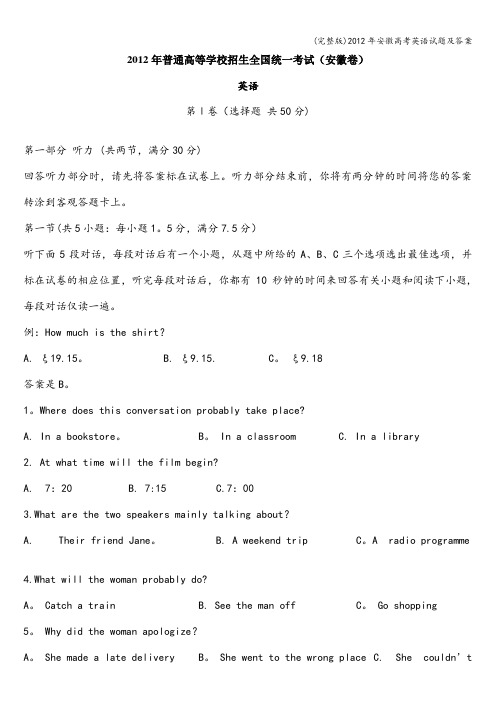
2012年普通高等学校招生全国统一考试(安徽卷)英语第Ⅰ卷(选择题共50分)第一部分听力 (共两节,满分30分)回答听力部分时,请先将答案标在试卷上。
听力部分结束前,你将有两分钟的时间将您的答案转涂到客观答题卡上。
第一节(共5小题:每小题1。
5分,满分7.5分)听下面5段对话,每段对话后有一个小题,从题中所给的A、B、C三个选项选出最佳选项,并标在试卷的相应位置,听完每段对话后,你都有10秒钟的时间来回答有关小题和阅读下小题,每段对话仅读一遍。
例:How much is the shirt?A. ξ19.15。
B. ξ9.15. C。
ξ9.18答案是B。
1。
Where does this conversation probably take place?A. In a bookstore。
B。
In a classroom C. In a library2. At what time will the film begin?A. 7:20B. 7:15C.7:003.What are the two speakers mainly talking about?A. Their friend Jane。
B. A weekend trip C。
A radio programme4.What will the woman probably do?A。
Catch a train B. See the man off C。
Go shopping5。
Why did the woman apologize?A。
She made a late delivery B。
She went to the wrong place C. She couldn’ttake the cake back第二节(共15小题:每小题1.5分,满分22.5分)听下面5段对话。
每段对话有几个小题,从题中所给的A、B、C三个选项中选出的最佳选项,并标在试卷的相应位置。
高考英语全国卷近三年考点分析
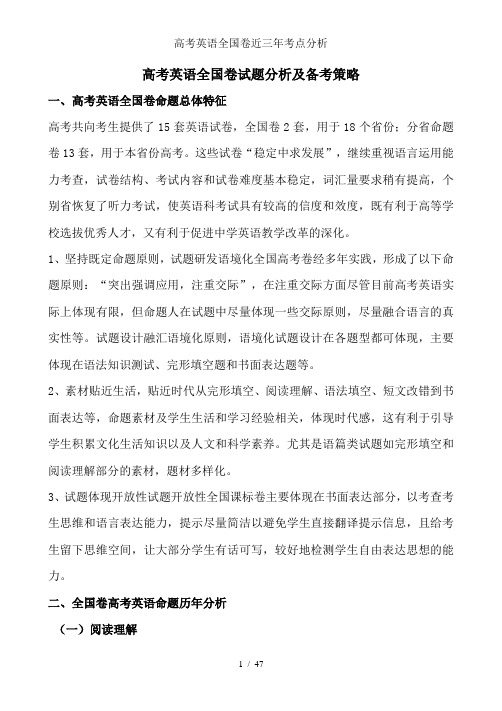
高考英语全国卷试题分析及备考策略一、高考英语全国卷命题总体特征高考共向考生提供了15套英语试卷,全国卷2套,用于18个省份;分省命题卷13套,用于本省份高考。
这些试卷“稳定中求发展”,继续重视语言运用能力考查,试卷结构、考试内容和试卷难度基本稳定,词汇量要求稍有提高,个别省恢复了听力考试,使英语科考试具有较高的信度和效度,既有利于高等学校选拔优秀人才,又有利于促进中学英语教学改革的深化。
1、坚持既定命题原则,试题研发语境化全国高考卷经多年实践,形成了以下命题原则:“突出强调应用,注重交际”,在注重交际方面尽管目前高考英语实际上体现有限,但命题人在试题中尽量体现一些交际原则,尽量融合语言的真实性等。
试题设计融汇语境化原则,语境化试题设计在各题型都可体现,主要体现在语法知识测试、完形填空题和书面表达题等。
2、素材贴近生活,贴近时代从完形填空、阅读理解、语法填空、短文改错到书面表达等,命题素材及学生生活和学习经验相关,体现时代感,这有利于引导学生积累文化生活知识以及人文和科学素养。
尤其是语篇类试题如完形填空和阅读理解部分的素材,题材多样化。
3、试题体现开放性试题开放性全国课标卷主要体现在书面表达部分,以考查考生思维和语言表达能力,提示尽量简洁以避免学生直接翻译提示信息,且给考生留下思维空间,让大部分学生有话可写,较好地检测学生自由表达思想的能力。
二、全国卷高考英语命题历年分析(一)阅读理解英语阅读技能是我国基础英语教育重点培养的语言技能,阅读理解在全国卷中占总分值37%。
阅读理解考查考生对书面英语的理解、推断和鉴赏等综合能力,要求考生读懂公告、说明、广告以及书、报、杂志中关于一般话题的简短文章。
阅读命题选材遵循语言真实、贴近时代和生活的原则,部分语篇融会思想性和教育性,传递正能量。
素材语篇体裁多样化,一般含记叙文、说明文和议论文等。
两节的阅读量相对稳定,5篇语篇词数合计1000余词。
1、分析(见阅读理解表1)纵观近三年全国卷高考试题,阅读理解的命题趋势如下:一从文章体裁来看:近年高考以说明文为主,应用文、记叙文和议论文为辅。
2012年英语高考试题答案及解析-全国

2012年普通高等学校招生全国统一考试英语注意事项:⒈本试卷分第Ⅰ卷(选择题)和第Ⅱ卷(非选择题)两部分。
答卷前,考生务必将自己的姓名、准考证填写在答题卡上。
⒉答第Ⅰ卷时,选出每小题答案后,用2B铅笔把答题卡上对应题目的答案标涂黑,如需改动,用橡皮擦干净后,再选涂其他答案标,不能答在本试卷上,否则无效。
⒊答第Ⅱ卷时,将答案写在答题卡上。
写在本试卷上无效。
⒋考试结束后,将本试卷和答题卡一并交回。
第Ⅰ卷第一部分英语知识运用(满分50分)第一节语音知识(共5小题;每小题1分,满分5分)从A、B、C、D四个选项中,找出其划线部分与所给单词的划线部分读音相同的选项,并在答题卡上将该项涂黑。
例:have A. gave B. save C. hat D. made答案是C。
⒈ theater A. treasure B. wheat C. season D. realize⒉ persuade A. usual B. insist C. sugar D. treasure⒊ pany A. alone B. carrot C. money D. knock⒋ opposite A. service B. outside C. pioneer D. police⒌ society A. official B. recent C. chocolate D. difficult第二节语法和词汇知识(共15小题;每小题1分,满分15分)从A、B、C、D四个选项中,选出可以入空白处的最佳选项,并在答题卡上将该项涂黑。
例:It is generally considered unwise to give a child ___ he or she wants.A. howeverB. whateverC. whicheverD. whenever答案是B。
⒍– What shall we do tonight then?– ___ – whatever you want.A. Help yourselfB. It’s a dealC. No problemD. It’s up to you⒎ He missed ___ gold in the high jump, but will get ___ second chance in the long jump.A. the; theB. 不填; aC. the; aD. a; 不填⒏ That evening, ___ I will tell you more about later, I ended up working very late.A. thatB. whichC. whatD. when⒐ Sarah made ___ to the airport just in time to catch her plane this morning.A. herselfB. thisC. thatD. it⒑ Tony lent me the money, ___ that I’d do as much for him.A. hopingB. to hopeC. hopedD. having hoped⒒ I had hardly got to the office ___ my wife phone me to go back home at once.A. whenB. thanC. untilD. after⒓ We ___ to paint the whole house but finished only the front part that day.A. set aboutB. set upC. set outD. set down⒔ Next to biology, I like physics ___ .A. betterB. bestC. the betterD. very well⒕– Did you ask Sophia for help?– I ___ need to – I managed perfectly well on my own.A. wouldn’tB. don’tC. didn’tD. won’t⒖ The old man sat in front of the television every evening, happy ___ anything that happened to be on.A. to watchB. watchingC. watchedD. to have watched⒗ 100℃is the temperature ___ which water will boil.A. forB. atC. onD. of⒘I’m going to Europe on vacation together with John if I ___ find the money.A. canB. mightC. wouldD. need⒙ The manager ___ the workers how to improve the program since 9 a.m.A. has toldB. is tellingC. has been tellingD. will have told⒚ The Harry Potter books are quite popular; they are in great ___ in this city.A. qualityB. progressC. productionD. demand⒛– Try not to work yourself too hard. Take it easy.– Thanks. ___A. So what?B. No way.C. What for?D. You, too.第三节完形填空(每小题1. 5分)阅读下面短文,从短文后各题所给的四个选项(A、B、C和D) 中,选出可以填入空白处的最佳选项,并在答题卡上将该项涂黑。
2012年高考英语试题及答案(全国卷)
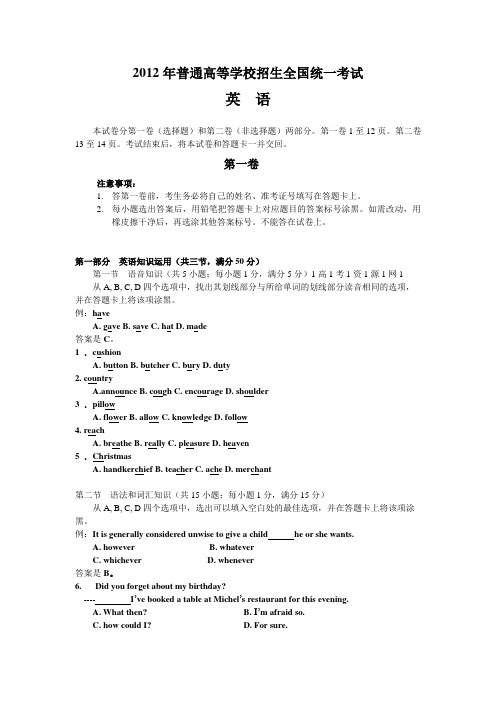
2012年普通高等学校招生全国统一考试英语本试卷分第一卷(选择题)和第二卷(非选择题)两部分。
第一卷1至12页。
第二卷13至14页。
考试结束后,将本试卷和答题卡一并交回。
第一卷注意事项:1.答第一卷前,考生务必将自己的姓名、准考证号填写在答题卡上。
2.每小题选出答案后,用铅笔把答题卡上对应题目的答案标号涂黑。
如需改动,用橡皮擦干净后,再选涂其他答案标号。
不能答在试卷上。
第一部分英语知识运用(共三节,满分50分)第一节语音知识(共5小题;每小题1分,满分5分)1高1考1资1源1网1 从A, B, C, D四个选项中,找出其划线部分与所给单词的划线部分读音相同的选项,并在答题卡上将该项涂黑。
例:haveA. gaveB. saveC. hatD. made答案是C。
1 .cushionA. buttonB. butcherC. buryD. duty2. countryA.announceB. coughC. encourageD. shoulder3 .pillowA. flowerB. allowC. knowledgeD. follow4. reachA. breatheB. reallyC. pleasureD. heaven5 .ChristmasA. handkerchiefB. teacherC. acheD. merchant第二节语法和词汇知识(共15小题;每小题1分,满分15分)从A, B, C, D四个选项中,选出可以填入空白处的最佳选项,并在答题卡上将该项涂黑。
例:It is generally considered unwise to give a child he or she wants.A. howeverB. whateverC. whicheverD. whenever答案是B。
6. ----Did you forget about my birthday?---- I‟ve booked a table at Michel‟s restaurant for this evening.A. What then?B. I‟m afraid so.C. how could I?D. For sure.7. Ted came for the weekend wearing only some shorts and a T-shirt, is a stupid thing to do in such weather.A. thisB. thatC. whatD. which8. If you smoke, please go outside.A. canB. shouldC. mustD. may9. If you don't like the drink you______just leave it and try a different one.A. orderedB. are orderingC. will orderD. had ordered10. Mary, I_____John of his promise to help you.A. toldB. remindedC. warnedD. advised11. I got this bicycle for ;My friend gave it to me when she bought a new one.A. everythingB. somethingC. anythingD. nothing12. It is one thing to enjoy listening to good music, but it is another to play it well yourself.A. quiteB. veryC. ratherD. much13. Jane won‟t join us for dinner tonight and .A. neither won‟t TomB. Tom won‟t eitherC. Tom will tooD. so will Tom14. This shop will be closed for repairs further notice.A. withB. untilC. forD. at15. The island, to the mainland by a bridge, is easy to go to.A. joiningB. to joinC. joinedD. having joined16. As he reached front door, Jack saw strange sight.A. the;不填B. a; theC.不填aD. the; a17.Mr. Stevenson is great to work for -- I really couldn't ask for a_boss.A. betterB. goodC. bestD. still better 18.Sarah pretended to be cheerful,______nothing about the argument.A. says B: said C. to say D. saying19. It was a nice meal,_______a little expensive.A. thoughB. whetherC. asD. since20.-----So you gave her your phone?-----______she said she'd return it to me when she could afford her own.A. My pleasureB. Not exactlyC. No doubtD. All right第三节完形填空(共20小题;每小题1.5分,满分30分)阅读下面短文,从短文后各题所给的四个选项(A, B, C和D)中,选出可以填入空白处的最佳选项飞并在答题卡上将该项涂黑。
超实用高考英语复习:2012年高考英语试题(全国新课标卷)完型填空(含答案解析)
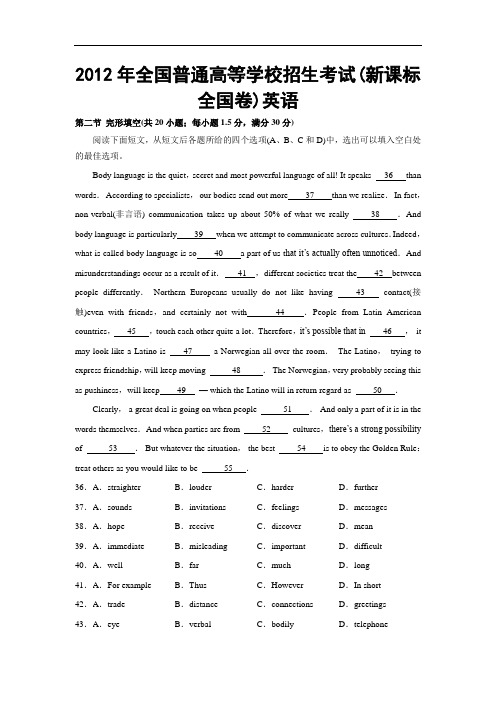
2012年全国普通高等学校招生考试(新课标全国卷)英语第二节完形填空(共20小题;每小题1.5分,满分30分)阅读下面短文,从短文后各题所给的四个选项(A、B、C和D)中,选出可以填入空白处的最佳选项。
Body language is the quiet,secret and most powerful language of all! It speaks 36than words.According to specialists,our bodies send out more 37 than we realize.In fact,non-verbal(非言语) communication takes up about 50% of what we really 38.And body language is particularly 39when we attempt to communicate across cultures.Indeed,what is called body language is so 40 a part of us t hat it’s actually often unnoticed.And misunderstandings occur as a result of it.41,different societies treat the 42between people differently.Northern Europeans usually do not like having 43contact(接触)even with friends,and certainly not with 44.People from Latin American countries,45,touch each other quite a lot.Therefore,it’s possible that in 46,it may look like a Latino is 47 a Norwegian all over the room.The Latino,trying to express friendship,will keep moving 48.The Norwegian,very probably seeing this as pushiness,will keep 49— which the Latino will in return regard as 50 .Clearly,a great deal is going on when people 51.And only a part of it is in the words themselves.And when parties are from 52cultures,there’s a strong possibility of 53 .But whatever the situation,the best 54 is to obey the Golden Rule:treat others as you would like to be 55.36.A.straighter B.louder C.harder D.further 37.A.sounds B.invitations C.feelings D.messages 38.A.hope B.receive C.discover D.mean 39.A.immediate B.misleading C.important D.difficult 40.A.well B.far C.much D.long 41.A.For example B.Thus C.However D.In short 42.A.trade B.distance C.connections D.greetings 43.A.eye B.verbal C.bodily D.telephone44.A.strangers B.relatives C.neighbours D.enemies 45.A.in other words B.on the other hand C.in a similar way D.by all means 46.A.trouble B.conversation C.silence D.experiment 47.A.disturbing B.helping C.guiding D.following 48.A.closer B.faster C.in D.away 49.A.stepping forward B.going on C.backing away D.coming out 50.A.weakness B.carelessness C.friendliness D.coldness 51.A.talk B.travel C.laugh D.think 52.A.different B.European C.Latino D.rich 53.A.curiosity B.excitement C.misunderstanding D.nervousness 54.A.chance B.time C.result D.advice 55.A.noticed B.treated C.respected D.pleased36.B【解析】根据首句的内容可知身势语比话语表达更"响亮"。
2024年高考英语第二轮复习备考建议及策略

2024年高考英语第二轮复习备考建议及策略一、词汇巩固在第二轮复习中,词汇的巩固是非常重要的。
我们建议学生们利用一些高效的方法来加深他们对词汇的记忆和理解。
例如,可以采用词汇卡片法,即把生词写在卡片的一面上,释义或例句写在另一面上,然后通过反复的查看和背诵来记忆词汇。
此外,学生们也可以尝试使用一些词汇学习软件或在线资源来辅助他们的词汇学习。
二、语法深化语法是英语语言结构的重要组成部分,因此在第二轮复习中,学生们需要对语法进行更深层次的学习和掌握。
建议学生们把之前学过的语法知识进行系统性的归纳和整理,理解每一个语法的结构、意义和用法。
此外,通过大量的阅读和写作训练来巩固和提高自己的语法应用能力也是很重要的。
三、阅读理解阅读理解是高考英语的重要组成部分,需要学生们重点练习。
我们建议学生们采用多种阅读方式,如泛读和精读结合,来提高他们的阅读速度和准确度。
此外,对于阅读中遇到的长难句和复杂句,学生们应该进行重点分析和理解。
同时,增加阅读量也是提高阅读理解能力的关键。
四、写作训练在写作方面,我们建议学生们定期进行写作训练,并注重提高自己的写作水平。
可以写一些话题作文、记叙文、说明文等不同类型的文章,练习不同类型的写作技巧。
此外,还可以通过阅读一些优秀的英文文章,学习他们的写作风格和表达方式,提高自己的写作水平。
五、听力提升听力是英语学习中不可或缺的一部分,对于高考英语来说尤为重要。
我们建议学生们采用多种方法来提高自己的听力水平,如听英文歌曲、看英文电影、听英语新闻等。
此外,还可以通过做一些听力练习题来提高自己的听力水平。
在听力过程中,注意把握关键词和语调,理解听力材料的结构和逻辑关系。
六、模拟考试模拟考试是高考复习的重要环节,可以帮助学生们了解自己的考试水平和薄弱环节。
我们建议学生们定期进行模拟考试,并对自己的考试成绩进行评估和分析。
在模拟考试后,应该重点复习自己薄弱的部分,调整复习策略和方法。
七、错题回顾最后,我们建议学生们在复习过程中定期回顾自己做错的题目。
2012年全国高考英语试题及答案
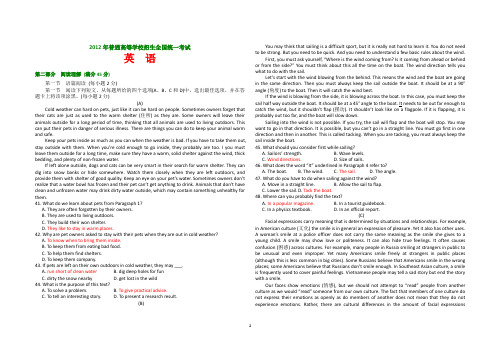
2012年普通高等学校招生全国统一考试英语第二部分阅读理解(满分45分)第一节语篇阅读(每小题2分)第一节阅读下列短文,从每题所给的四个选项(A、B、C和D)中,选出最佳选项,并在答题卡上将该项涂黑。
(每小题2分)(A)Cold weather can hard on pets, just like it can be hard on people. Sometimes owners forget that their cats are just as used to the warm shelter (住所) as they are. Some owners will leave their animals outside for a long period of time, thinking that all animals are used to living outdoors. This can put their pets in danger of serious illness. There are things you can do to keep your animal warm and safe.Keep your pets inside as much as you can when the weather is bad. If you have to take them out, stay outside with them. When you’re cold enough to go inside, they probably are too. I you must leave them outside for a long time, make sure they have a warm, solid shelter against the wind, thick bedding, and plenty of non-frozen water.If left alone outside, dogs and cats can be very smart in their search for warm shelter. They can dig into snow banks or hide somewhere. Watch them closely when they are left outdoors, and provide them with shelter of good quality. Keep an eye on your pet’s water. Sometimes owners don’t realize that a water bowl has frozen and their pet can’t get anything to drink. Animals that don’t have clean and unfrozen water may drink dirty water outside, which may contain something unhealthy for them.41. What do we learn about pets from Paragraph 1?A. They are often forgotten by their owners.B. They are used to living outdoors.C. They build their won shelter.D. They like to stay in warm places.42. Why are pet owners asked to stay with their pets when they are out in cold weather?A. To know when to bring them inside.B. To keep them from eating bad food.C. To help them find shelters.D. To keep them company.43. If pets are left on their own outdoors in cold weather, they may ___.A. run short of clean waterB. dig deep holes for funC. dirty the snow nearbyD. get lost in the wild44. What is the purpose of this text?A. To solve a problem.B. To give practical advice.C. To tell an interesting story.D. To present a research result.(B)You may think that sailing is a difficult sport, but it is really not hard to learn it. You do not need to be strong. But you need to be quick. And you need to understand a few basic rules about the wind.First, you must ask yourself, “Where is the wind coming from? Is it coming from ahead or behind or from the side?” You must think about this all the time on the boat. The wind direction tells you what to do with the sail.L et’s start with the wind blowing from the behind. This means the wind and the boat are going in the same direction. Then you must always keep the sail outside the boat. It should be at a 90°angle (角度) to the boat. Then it will catch the wind best.If the wind is blowing from the side, it is blowing across the boat. In this case, you must keep the sail half way outside the boat. It should be at a 45° angle to the boat. It needs to be out far enough to catch the wind, but it shouldn’t flap (摆动). It shouldn’t look like on a flagpole. If it is flapping, it is probably out too far, and the boat will slow down.Sailing into the wind is not possible. If you try, the sail will flap and the boat will stop. You may want to go in that direction. It is possible, but you can’t go in a straight line. You must go first in one direction and then in another. This is called tacking. When you are tacking, you must always keep the sail inside the boat.45. What should you consider first while sailing?A. Sailors’ strength.B. Wave levels.C. Wind directions.D. Size of sails.46. What does the word “It” underlined in Paragraph 4 refer to?A. The boat.B. The wind.C. The sail.D. The angle.47. What do you have to do when sailing against the wind?A. Move in a straight line.B. Allow the sail to flap.C. Lower the sail.D. Tack the boat.48. Where can you probably find the text?A. In a popular magazine.B. In a tourist guidebook.C. In a physics textbook.D. In an official report.(C)Facial expressions carry meaning that is determined by situations and relationships. For example, in American culture (文化) the smile is in general an expression of pleasure. Yet it also has other uses.A woman’s smile at a police officer does not carry the same meaning as the smile she gives to a young child. A smile may show love or politeness. It can also hide true feelings. It often causes confusion (困惑) across cultures. For example, many people in Russia smiling at strangers in public to be unusual and even improper. Yet many Americans smile freely at strangers in public places (although this is less common in big cities). Some Russians believe that Americans smile in the wrong places; some Americans believe that Russians don’t smile enough. In Southeast Asian culture, a smile is frequently used to cover painful feelings. Vietnamese people may tell a sad story but end the story with a smile.Our faces show emotions (情感), but we should not attempt to “read”people from another culture as we would “read” someone from our own culture. The fact that members of one culture do not express their emotions as openly as do members of another does not mean that they do not experience emotions. Rather, there are cultural differences in the amount of facial expressionspermitted. For example, in public and in formal situations many Japanese do not show their emotions as freely as Americans do. When with friends, Japanese and Americans seem to show their emotions similarly.It is difficult to generalize about Americans and facial expressiveness because of personal and cultural differences in the United States. People from certain cultural backgrounds in the United States seem to be more facially expressive than others. The key is to try not to judge people whose ways of showing emotion are different. If we judge according to our own cultural habits, we may make the mistake of “reading” the other person incorrectly.49. What does the smile usually mean in the U.S.?A. Love.B. Politeness.C. Joy.D. Thankfulness.50. The author mentions the smile of the Vietnamese to prove that smile can ___ .A. show friendliness to strangersB. be used to hide true feelingsC. be used in the wrong placesD. show personal habits51. What should we do before attempting to “read” people?A. Learn about their relations with others.B. Understand their cultural backgrounds.C. Find out about their past experience.D. Figure out what they will do next.52. What would be the best title for the test?A. Cultural DifferencesB. Smiles and RelationshipC. Facial ExpressivenessD. Habits and Emotions(D)ADDIS ABABA, Ethiopia – One of the world’s most famous fossils (化石) – the 3.2million-year-old Lucy skeleton (骨骼) unearthed in Ethiopia in 1974 – will go on an exhibition tour abroad for the first time in the United States, officials said Tuesday.Even the Ethiopian public has only seen Lucy twice. The Lucy on exhibition at the Ethiopian National Museum in the capital, Addis Ababa, is a replica while the real remains are usually locked in a secret storeroom. A team from the Museum of National Science in Houston, Texas, spent four years discussing with the Ethiopians for the U.S. tour, which will start in Houston next September.“Ethiopia’s rich culture of both the past and today, is one of the best kept secrets in the world,”said Joel Bartsch, director of the Houston museum.The six-year tour will also go to Washington, New York, Denver and Chicago. Officials said six other U.S. cities may be on the tour. But they said plans had not been worked out.Travelling with Lucy will be 190 other fossils.Lucy, her name taken from a Beatles song that played in a camp the night of her discovery, is part of the skeleton of what was once a 312-foot-tall ape-man (猿人).53. The author writes this text mainly to ___ .A. introduce a few U.S. museumsB. describe some research workC. discuss the value of an ape-manD. report a coming event54. What does the words “a replica” in Paragraph 2 refer to?A. A painting of the skeleton.B. A photograph of LucyC. A copy of the skeleton.D. A written record of Lucy.55. How many cities has Lucy’s U.S. tour plan already included?A. Four.B. Five.C. Six.D. Eleven.56. What was the skeleton named after?A. An ape-man.B. A song.C. A singer.D. A camp.(E)Make Up Your Mind to SucceedKind-hearted parents have unknowingly left their children defenseless against failure. The generation born between 1980 and 2001 grew up playing sports where scores and performance were played down because “everyone’s winter.” And their report cards sounded more positive (正面的) than ever before. As a result, Stanford University professor Carol Dweck, PhD, calls them “the overpraised generation.”Dweck has been studying how people deal with failure for 40 years. Her research has led her to find out two clearly different mind-sets that have a great effect on how we react to it. Here’s how they work:A fixed mind-set is grounded in the belief that talent (才能) is genetic –you’re a born artist, point guard, or numbers person. The fixed mind-set believes it’s sure to succeed without much effort and regards failure as personal shame. When things get difficult, it’s quick to blame, lie, and even stay away from future difficulties.On the other hand, a growth mind-set believes that no talent is entirely heaven-sent and that effort and learning make everything possible. Because the ego (自尊) isn’t on the line as much, the growth mind-set sees failure as a chance rather than shame. When faced with a difficulty, it’s quick to rethink, change and try again. In fact, it enjoys this experience.We are all born with growth mind-sets. (Otherwise, we wouldn’t be able to live in the world.) But parents, teachers, and instructors often push us into fixed mind-sets by encouraging certain actions and misdirecting praise. Dweck’s book, Mind-set: The New Psychology of Success, and online instructional program explain this in depth. But she says there are many little things you can start doing today to make sure that your children, grandchildren and even you are never defeated by failure.57. What does the author think about the present generation?A. They don’t do well at school.B. They are often misunderstood.C. They are eager to win in sports.D. They are given too much praise.58. A fixed mind-set person is probably one who ___ .A. doesn’t want to work hardB. cares a lot about personal safetyC. cannot share his ideas with othersD. can succeed with the help of teachers59. What does the growth mind-set believe?A. Admitting failure is shameful.B. Talent comes with one’s birth.C. Scores should be highly valued.D. Getting over difficulties is enjoyable.60. What should parents do for their children based on Dweck’s study?A. Encourage them to learn from failures.B. Prevent them from making mistakes.C. Guide them in doing little things.D. Help them grow with praise.第二节根据对话内容,从对话后的选项中选出能填入空白处的最佳选项,并在答题卡上将该项涂黑。
高三英语的高考冲刺复习计划5篇
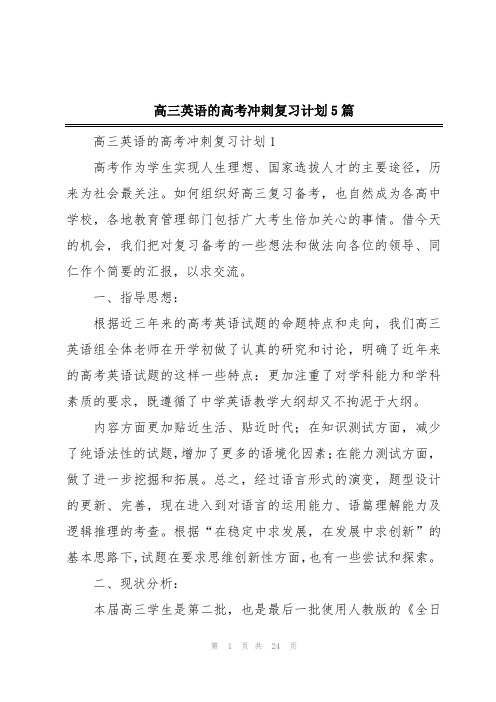
高三英语的高考冲刺复习计划5篇高三英语的高考冲刺复习计划1高考作为学生实现人生理想、国家选拔人才的主要途径,历来为社会最关注。
如何组织好高三复习备考,也自然成为各高中学校,各地教育管理部门包括广大考生倍加关心的事情。
借今天的机会,我们把对复习备考的一些想法和做法向各位的领导、同仁作个简要的汇报,以求交流。
一、指导思想:根据近三年来的高考英语试题的命题特点和走向,我们高三英语组全体老师在开学初做了认真的研究和讨论,明确了近年来的高考英语试题的这样一些特点:更加注重了对学科能力和学科素质的要求,既遵循了中学英语教学大纲却又不拘泥于大纲。
内容方面更加贴近生活、贴近时代;在知识测试方面,减少了纯语法性的试题,增加了更多的语境化因素;在能力测试方面,做了进一步挖掘和拓展。
总之,经过语言形式的演变,题型设计的更新、完善,现在进入到对语言的运用能力、语篇理解能力及逻辑推理的考查。
根据“在稳定中求发展,在发展中求创新”的基本思路下,试题在要求思维创新性方面,也有一些尝试和探索。
二、现状分析:本届高三学生是第二批,也是最后一批使用人教版的《全日制普通高级中学》英语教材,此教材与以前的教材相比词汇量大了,内容也更加丰富,为培养学生的语言交际能力搭建了一个很好的平台。
经过高一高二两年的学习大部分学生语言能力,特别是在阅读能力发面有了很大的发展和提高。
但是知识结构尚有缺陷,基础不够扎实,写作能力欠缺,书写不规范,还缺乏良好的思维品质、应试心理和答题技巧。
高三英语总复习任重道远。
就教材而言,还有高三全册的教学任务(下半册为学生自读课本,要求学生掌握课后的单词及词组即可)。
时间短,内容多,有条不紊地完成高三的新课学习,开展总复习任务,使学生在__年高考中取得理想的成绩是我们全体高三英语老师的工作目标。
三、工作策略:夯实双基、以本为本。
广撷博采、延伸课本。
查漏补缺、回归课本。
厚积薄发、超越课本。
四、主要任务:1、突出语言基础知识。
高考英语备考复习计划

高考英语备考复习计划高考英语正在冲刺复习中,英语备考复习计划该如何制定呢?接下来店铺为你整理了高考英语备考复习计划,一起来看看吧。
高考英语备考复习计划(一)高三一轮复习已经过去了一半多的时间,同学们在英语学习上可还得心应手?一轮复习中,老师课堂上的内容主要包括语法巩固和高考必备词汇拓展讲解,期间结合各题型的技巧及练习。
俗话说得好:工欲善其事,必先利其器。
唯有扎实的基础,才能淡定面对难度进阶的各题型,不慌张,将理论转化为实践。
作为与高考考试内容衔接紧密的期末考试,同学们要做好准备,要深知考试内容万变不离其宗。
离期末还有不到一个月的时间,同学们需要制定复习计划,还需及时查漏补缺,有疑问及时解决,切忌一拖再拖,免得知识漏洞越来越大。
正所谓,知己知彼,百战不殆。
首先,了解一下期末英语考试各题型及分值。
其次,建议大家将往年的各区英语期末试卷在考前进行练习,最好可以限定时间,让自己有充分的把握完成整张试卷,不断调整做题策略和时间,找到最舒适的做题顺序。
再次,针对期末复习,各题型复习方法如下:一、听力听力属于考试必拿分。
如果听力还失分,则需要多加练习,最好保证每天听20-30分钟,可以通过听课内课文或者课外的英语文章亦或英文歌曲都会有所帮助的。
切记:听力的提高在于坚持。
二、单项选择单项选择综合考察同学们对高中语法的把握程度,是必拿分。
主要包括三大考点(动词时态语态、非谓语动词、三大从句)及几个小考点(情态动词及虚拟语气、特殊句式、介词、代词)。
第一、同学们一定要将各个语法点系统掌握,搭建知识网。
现在还有部分同学面对众多语法知识点而迷茫着,建议同学们在一轮复习仅剩的一个月时间里,试着通过思维导图的方式,并借助靠谱的语法书,例如:《五三》、《无敌英语语法》,将语法点进行梳理;同时需要针对性地练习,提高做题效率;第二、相信各位同学都有准备一本单选订错本,但是我发现有许多同学仅仅只是将题和答案记下,并无订错痕迹,之后还很有可能再错,那么同学们就需要找找原因何在。
近三年高考英语试题及答案
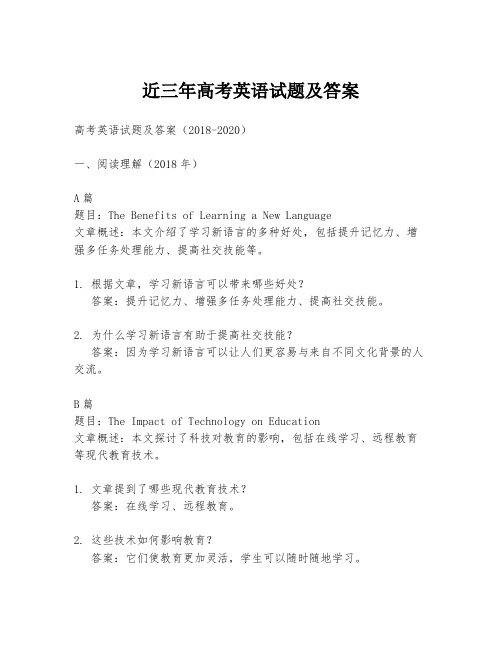
近三年高考英语试题及答案高考英语试题及答案(2018-2020)一、阅读理解(2018年)A篇题目:The Benefits of Learning a New Language文章概述:本文介绍了学习新语言的多种好处,包括提升记忆力、增强多任务处理能力、提高社交技能等。
1. 根据文章,学习新语言可以带来哪些好处?答案:提升记忆力、增强多任务处理能力、提高社交技能。
2. 为什么学习新语言有助于提高社交技能?答案:因为学习新语言可以让人们更容易与来自不同文化背景的人交流。
B篇题目:The Impact of Technology on Education文章概述:本文探讨了科技对教育的影响,包括在线学习、远程教育等现代教育技术。
1. 文章提到了哪些现代教育技术?答案:在线学习、远程教育。
2. 这些技术如何影响教育?答案:它们使教育更加灵活,学生可以随时随地学习。
二、完形填空(2019年)文章概述:本文讲述了一个年轻人通过不懈努力,最终实现了自己的职业梦想。
1. 为什么主角选择继续他的学业?答案:因为他相信教育能够为他打开新世界的大门。
2. 他是如何克服困难的?答案:通过坚持不懈和积极寻求帮助。
三、语法填空(2020年)文章概述:本文描述了一位科学家的发现之旅,以及他的发现如何改变了人们对某个科学领域的看法。
1. 在第一段中,“____”(填入适当的词)这个词应该填什么?答案:discovery2. 第二段中提到的“____”(填入适当的词)是什么意思?答案:revolutionize四、短文改错(2018-2020年综合)文章概述:本文是一篇关于如何提高学习效率的建议文章。
1. 错误:The best way to improve your study efficiency is to make a plan.改正:The best way to improve your study efficiency is to make a plan.2. 错误:You should also try to avoid to use your phone too much.改正:You should also try to avoid using your phone too much.五、书面表达(2018-2020年综合)题目:请以“My Hometown”为题,写一篇短文,描述你的家乡。
2012年高考英语试卷分值及分析

2012年高考英语试题分值第一部分:听力(共两节,满分20 分)第一节(共5 小题;每小题1 分,满分5分)第二节(共15 小题;每小题1 分,满分15 分)第二部分: 英语知识运用(共两节, 满分35 分)第一节: 单项填空(共15小题; 每小题1分,满分15分)第二节: 完形填空(共20 小题; 每小题1 分, 满分20 分)第三部分: 阅读理解(共15 小题; 每小题2 分, 满分30 分)第四部分: 任务型阅读(共10 小题;每小题1 分,满分10 分)第五部分: 书面表达(满分25 分)2012年高考英语试题分析一、听力仍平稳。
听力题沿用了全国命题的材料,话题涉及购物、餐饮、度假等,大多数同学在平时的训练材料中能听到。
语速与去年相仿,材料基本上从短到长。
最后一段改用了对话,替代了以前的独白。
二、单选重交际。
今年的单选题比以往更重生活实际,语言简洁明了,很好地诠释了语法在交际中的语用功能。
同去年有所不同的是,减少了词汇辨析题,增加了一道交际题和反义疑问句考题(25道)。
三、完形变文体。
完形填空第一次改变了文体,由原先夹叙夹议、叙述为主的文章,变成了一篇纯议论文,长句、难句明显增多,没有故事与情节,从而大大增加了完成难度。
四、阅读增难度。
阅读题一共4篇,其中C、D两篇阅读的难度都比较大。
今年的阅读篇目首先改变了顺序,应用文放在了第一篇。
其次是创新,原先的猜词题变成了猜短语与猜句子。
具体来说:A篇阅读是一篇应用文,内容是关于“如果你一个人独自留在一个孤岛上,你最需要什么?”的调查,题目设置难度还好;B篇是讲“美国农业缺少专业大学生从事农业生产”的问题,也不算难;C篇阅读题是一篇科普文章,讲的是“怎样使用胶囊,让吃药更加安全、疗效好”,这篇生词比较多,汉语注释达6个。
其中65题还首次考了填词题;D篇阅读不是以往的文学作品,内容讲的则是“老师谈教学生文学阅读的感受”。
文章较长,长句难句明显增多。
- 1、下载文档前请自行甄别文档内容的完整性,平台不提供额外的编辑、内容补充、找答案等附加服务。
- 2、"仅部分预览"的文档,不可在线预览部分如存在完整性等问题,可反馈申请退款(可完整预览的文档不适用该条件!)。
- 3、如文档侵犯您的权益,请联系客服反馈,我们会尽快为您处理(人工客服工作时间:9:00-18:30)。
近三年安徽高考英语试题分析及2012年高考复习建议2011年安徽高考英语试题,难度适中,和前两年相比具有稳定性,难中易比例为2:5:3。
试题在全面考查了考生对语言知识掌握情况的同时,侧重考查考生的综合语言运用能力,注重了对考生情感、态度、价值观的考查。
试题素材更加贴近社会,贴近时代,贴近生活。
一、听力
听力部分仍采用全国卷听力考查试题,特点是语速较慢,浅显易懂。
大部分题目可以从对话或独白中直接获取答案,少量题目次要信息较多,学生易于受到干扰,需要推断和概括。
数字类的题目还是安徽听力的传统听力题型,例如第3题,地点类例如6,9,13,14.推测判断类7,8,12,15,细节类10,11。
总体看来考生只要在平时保证了一定量的听力练习,并且注重一些基本单词的把握,就可以很好的应对。
建议每天听二十分钟。
二.单项选择。
考查学生依据题干所给的语境条件进行分析、对比,灵活地运用各项英语基础知识,体现了"知识与能力并重"的思想,如基本语法、习惯用语、交际用语和各种常见表达法等。
考查重点如下:
1.时态。
2011年3题,一题一般现在时,一题现在完成时,一题一般将来时。
2010年3题,
分别是一般过去式,过去完成时和现在完成进行时。
2009年3题,两题一般现在时,一题一般将来进行时。
2.情景交际题。
2011年3题,2010年2题,2009年2题。
3.非谓语动词。
2011年1题,2010年2题,2009年2题。
4.词组。
2011年2题,2010年3题,2009年3题。
5.从句方面。
2011年考了一题定语从句,没考状语从句。
2010年考了两题状语从句,没考定语从句。
2009年考了一题定语从句和一题宾语从句,没考状语从句。
6.情态动词。
2011年没考,2010年和2009年都有一题。
7.其他考纲要求的语法项目在三年中轮流考查。
如词性方面,2011年考了一个副词,“Thankfully"和一个反身代词“itself"。
2010年考了一个形容词作状语"lighthearted and optimistic"。
2009年考了一题介词。
再如2011年考了一题主谓一致,2010年考了一题
"It's…that…"的强调句型,2009年考了一题"There remains…"的固定句型。
针对以上情况,我们在一轮复习中要以词汇、语法、固定句型为重点,强调在句子中熟悉词汇,运用词汇。
帮助学生分析句子结构,学会缩句子和扩句子。
三.完形填空
2011年的完形填空是一篇以叙事为主,结尾有一小段议论的短文,难度适中。
2010年的
完形填空是一篇说明文,说明了怎样选购一支好的钢笔三个步骤,难度适中。
2009年也是一篇夹叙夹议的短文,难度适中。
从考点上看,主要考查实词,兼顾虚词。
请看下表。
可以看出高考完形题重点考查名词、动词、形容词、和词组,而且形容词为六个左右。
要求考生立足语篇,语义语境的深层次理解,具备一定的逻辑思维能力,所以在平时的练习中一定要注意高频词汇的积累,对于这些常考词的词性、词义和用法要有准确无误的把握。
四.阅读理解。
根据考试大纲,阅读理解考查学生六个方面的能力,即理解事实细节、理解主旨要义、推理判断、猜测词义、理解文章的基本结构、理解作者的意图,观点和态度。
下面是近三年的阅读理解题的考点分布表。
从上表可以看出事实细节题从14个减少到5个左右,推理判断题增加到10个左右,主旨要义题增加到4个。
题材涵盖说明文、夹叙夹议文、科普知识类,社会文化类、人文历史类等不同文体或题材的文章,保持了自2005年安徽自主命题以来的稳定性,知识性,趣味性,信息量大,题材与体裁广泛的特点,彰显文化特色,同时具有一定的价值观教育作用。
要做好阅读理解题必须具有一定的词汇量、阅读量和基本的推理判断能力。
那是一个积累的过程,一个从量变到质变的过程,没有捷径可走。
五、任务型阅读
任务型阅读是2009年起高考新增的题型,今年是第三年考察,主要考查的是学生用英语做事、解决实际问题的能力,是典型的语言应用测试。
题型设置中既有一定量的捕捉信息题(基础题),也有活用题和综合概括题。
和2010年相比,今年的任务型阅读题难度有所下降。
见下表:
在大一轮复习中要重视词汇识记,词性转换,同义词,反义词训练,培养学生综合概括能力。
六.书面表达。
2011和2010年的书面表达都有一定的开放性,和2009年的提纲式作文有较大的区别。
提纲式作文内容固定,考生不能遗漏要点,不能过多发挥。
开放性作文自由度较大,写作内容非常贴近学生的生活实际,考生有话可说,容易言之有理,易于发挥出水平,同时也能够多角度展现学生英语学习存在的各种疑难症状,考生也能多方面的发散思维。
书面表达能力同样是功夫在平时。
在一轮复习中要注意规范性练习,规范写单词,规范写句子。
背诵固定句型,翻译句子,一句多译,背诵词组,用词组造句,句型转换等等。
根据以上分析2012年高考英语复习要抓好以下几点。
一.过词汇关。
对1-8册课本词汇进行拉网式的复习。
可以制作有中文无英文的词汇表,要求学生填上单词和词组并造句或找个句子。
再印发考纲英文词汇,要求学生逐一识别和思考,对陌生词做上标记,重点记忆,并给该词补充信息以强化记忆。
在课堂上老师要将每个单元的重点单词和词组进行讲解、分析、比较引导学生运用,在运用中记忆,活学活用,学以致用。
二.过语法关。
一轮复习要让学生构建语法知识体系。
整个英语语法体系大致可分为十六个模块,分别是1.名词2.介词和介词短语3.冠词4.代词5.数词6.形容词和副词7.动词和动词短语8.时态和语态9.非谓语动词10.情态动词和虚拟语气11.定语从句12.名词性从句13.
状语从句14.并列句15.主谓一致16.特殊句式。
在复习课本的同时每周要安排一定的时间复习语法模块,有针对性的训练某一个语法模块。
各备课组老师可以进行分工协作,根据考纲深入研究,编制符合本校学生特点的语法训练题,在做题和讲解中掌握和运用语法知识。
对一些重点模块如非谓语动词和定语从句等要加大训练力度,让那些成绩较差的学生也能弄懂和运用,大面积丰收才有希望。
三.狠抓阅读训练。
有了基本的词汇和语法知识并不等于语言能力就高。
阅读训练是整合内化语言知识的必要途径。
学生在阅读中领悟词汇和语法知识,理解作者的创作意图,体会用英语获取知识和信息的乐趣。
达到一定阅读量以后,学生对文意理解的准确性大为提高,速度也上去了。
一轮复习中老师对阅读材料的选择大有讲究,太难或太易都不利。
要选择一些适合本校学生水平的材料,逐步提高难度。
还要注意选材的多样性,知识性和趣味性等问题。
有时还要对材料进行一些处理以适应本班学生。
综上所述,2011年安徽高考试题难易适中,稳重求变,通过语篇考察学生语言、思考、分析和判断的能力,可以说是一次成功的试题。
对于下一届高考考生来说,更多的应该从考试中吸取经验,关注生活,关注社会。
还要研究历年真题,从真题中领悟复习策略。
通过不懈的努力定能取得不俗的成绩。
